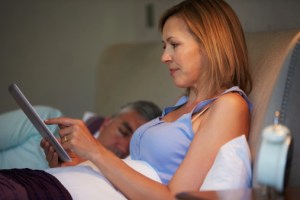DENVER — If you go to bed reading with a tablet or phone, you may be damaging your sleep habits and long term health, a research team warns.
Researchers at Harvard Medical School compared reading a paper book before bedtime to reading a light-emitting e-book.
They found it took longer for patents with the e-book to fall asleep, which led to poorer sleep quality and being more tired the next morning.
Study: Lack of sleep might shrink your brain
The findings were published in the journal Proceedings of the National Academy of Sciences.
Twelve people entered a sleep laboratory for two weeks. They spent five days reading from a paperback book and five days from a iPad.
Each participant gave blood samples in which the team looked for melatonin, a sleep hormone.
The team found that melatonin levels were reduced in the iPad users and those people also took longer to fall asleep, had less deep sleep and reported feeling more tired in the morning.
“Furthermore,” the report adds, “not only did they awaken feeling sleepier, it took them hours longer to fully ‘wake up’ and attain the same level of alertness than in the printed book condition.”

All of us have an internal clock that helps keep us in tune with the rhythm of the day. This clock uses light to tell the time.
However, blue light, which is common in smartphones and LED lighting, can disrupt the body clock and prevent the production or melatonin.
The researchers said e-readers like the Nook and Kindle Fire produced similar wavelengths of light. Early versions of Amazon Kindle that were not backlit should be okay, the team found.
“Many people read things to help them fall asleep,” Charles Czeisler, one of the study’s authors, told The Wall Street Journal. “They probably don’t realize that this technology is actually making them less likely to feel sleepy.”
